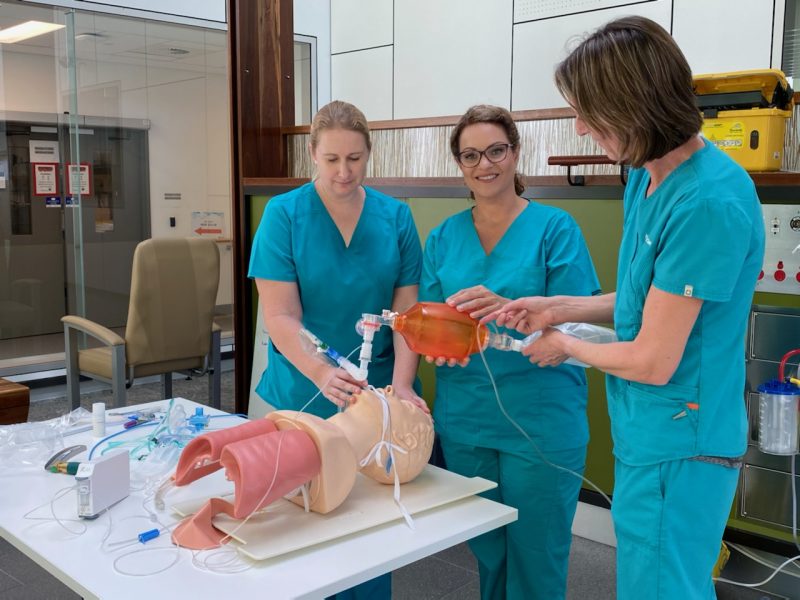グローバル・ボイスの特集ページ「新型コロナウイルスの世界的影響」をご覧ください。
ヘレン・ザホスはオーストラリアの救急看護師であり、救命救急士である。現在ゴールドコースト大学病院の新型コロナウイルス患者を受け入れている集中治療室で働いている。ザホスは海外で、災害や非常時、また難民問題の状況下で人道ボランティアとして幅広い経験を積んできた。グローバル・ボイスは、2016年ザホスがギリシャでの活動から帰国した時に最初のインタビューを行った。最近では、ザホスはケニア郊外で看護師活動プログラムに参加した。
著者はオーストラリアに帰国したザホスにインタビューを行った。
ケビン・レニー(以下KR):ケニアで看護師活動プログラムに参加した今回のボランティアで、特に感じたことを教えてください。
Helen Zahos (HZ): That the disparities in health care between developing countries and developed countries are ever present and that volunteer programs have to maintain a focus on sustainability and involve community members so they are empowered. That education and sharing your knowledge is an integral part of humanitarian nursing, as it is through sharing your skills and knowledge that you empower local Kenyan nurses. In turn they educate the locals in the community and encourage them to access the care they need.
ヘレン・ザホス(以下HZ):途上国と先進国の間のヘルスケアにおける格差が依然として存在しています。ボランティアのプログラムは持続可能であることに目を向け、その社会の人々を巻き込み彼らに権限を与えるなどしてゆかなくてはなりません。教育をして知識を共有することは、人道的な看護に不可欠です。技術や知識を共有することにより、ケニアの現地で働く看護師の力量を上げることができるのです。そして今度はケニアの看護師が、地域の人々を教育し、地元の人々が必要なケアを習得できるのです。
KR:世界各国の難民ともかかわってこられましたが、最近のあなたのケニアでの経験とは、どのような違いがありましたか?
HZ: The experience was very different. The refugee crisis was a slow-moving disaster. It overwhelmed specific countries that could not cope with the influx of people and it exceeded the capabilities of existing resources and infrastructure. The refugees were on the move and fleeing conflict, they were not living in homes but in refugee camps. Health care issues included chronic conditions but also physical and emotional trauma.
While Kenya is one of East Africa’s most advanced and richest countries, poverty is common. Deeply seeded systemic issues in health care mean that many people lack access to medical facilities or they cannot afford to seek treatment. There are endemic diseases such as malaria and HIV affecting many people. With limited funding or resources, it is often up to civil society to fill in the gaps and assist.
HZ:ケニアでの経験は、今までのボランティア活動とは非常に違うものでした。難民危機はゆっくりと進行する問題です。それは、人々の流入に対応できない特定の国々に多大な影響を与えました。入ってくる難民の数が、現在保有する資源やインフラの限度を超してしまったことによります。難民は移動し、紛争から逃れていて、家ではなく難民キャンプで生活しています。ヘルスケアの問題は、長年にわたる生活状況だけではなく、身体的または感情的トラウマも含んでいるのです。
ケニアは西アフリカで最も進んだ豊かな国の一つでありながら、貧困はありふれています。ヘルスケアにおいて深く根差した体系的な問題は、多くの人々が医療施設に行くことができないこと、あるいは治療を求めることができないということです。多くの人々に影響を及ぼすマラリアやHIVのような風土病もあります。財源や資源が限られている中、手の行き届かない所にも配慮して援助を行えるかどうかは、市民社会にかかっていると言えます。
KR:あなたは特に大変な時期に、オーストラリアの集中治療室における救命救急看護に戻られました。すでに新型コロナウイルスの影響を受けましたか?
HZ: My hospital has COVID-19 patients and the Intensive Care Unit does as well. It can be daunting as you approach the area where you get changed and approach the area that is separated from the COVID-19 patients because of the seriousness of this virus and how easily it spreads. It is hot under the Personal Protective Equipment (PPE), the masks are tight and claustrophobic and it is hard to talk to patients.
HZ:私の病院は新型コロナウイルスの患者を受け入れており、集中治療室もそうです。そのエリアに近づくと、威圧されるかもしれません。そこで服を着替えて、新型コロナウイルスの患者が隔離されている所に近づきます。このウイルスは深刻で、容易に広がってしまうからです。個人用の防護服は暑苦しく、防護マスクは窮屈で閉所恐怖症になってしまいそうですし、患者に話をするのも難しいほどです。

新型コロナウイルスへの対応に備える、ゴールドコースト大学病院、集中治療室スタッフの訓練、2020年4月。写真提供:ヘレン・ザホス
KR:オーストラリアの病院システムにおいて、看護師や他の医療従事者が最優先していることは何ですか?
HZ: To source more staff; have them trained and ready; source equipment and increase supplies. To put into practice the guidelines for pandemics. We have been preparing for the worst.
Integration and communication are vital: training and preparing all staff involved in the hospital system, transparency and sharing of information to assist other countries and standardising triage and treatment systems to cope with an influx of patients. Conducting mass screening and testing in the community by running fever clinics have been essential for early detection.
HZ:より多くのスタッフの確保です。彼らを訓練し準備する必要があります。また備品をそろえ、供給を増やすことや、パンデミックに対応するガイドラインを実践することも必要です。私たちは最悪の事態に備えています。
また、調整とコミュニケーションが不可欠です。まず、病院システムに関わるすべてのスタッフの訓練と準備、そして他の国々を支援するための情報の透明化や共有、さらに患者を迎え入れるにあたっての、トリアージや治療システムの標準化も求められます。発熱外来を運営して地域の多数の患者のふるい分けや検査を実施することが、初期の発見のために重要となってきます。
KR:この時期、先住民の地域が直面する課題は何でしょうか?
HZ: The possibility of a pandemic spreading to and affecting our remote indigenous populations is really concerning and very possible. Our indigenous people have higher co-morbidities and lower life expectancy than non-indigenous Australians. We could see the demise of entire indigenous communities if COVID-19 spreads to these remote areas, where large families live in close proximity, there are mass gatherings for cultural practices and they tend to be nomadic.
The Northern Territory has led the way by closing its borders and access to remote areas, important steps in stopping the spread of the virus. Remote area health centres need to be vigilant and detect any cases early, to educate indigenous people about the virus and to conduct health promotion on hand washing and social distancing.
HZ:遠く離れた先住民の人々へパンデミックが広がる可能性やその影響は本当に気がかりですし、十分にあり得ます。先住民の人々は、それ以外のオーストラリア人と比べて合併症を起こしやすく、平均寿命も短いのです。もし新型コロナウイルスが彼らの地域にまで蔓延することになれば、彼らのコミュニティ全体に深刻な影響が出るかもしれません。というのも彼らは、大家族がとても接近して暮らしていますし、慣習により大人数が集まって遊牧の生活をしているからです。
ノーザンテリトリーでは、州の境を閉鎖し、遠隔地へのアクセスを閉ざしてきました。これはウイルスの拡大を防ぐために重要なステップです。遠隔地域の保健所は警戒を怠らず、あらゆる事例を早期にみつける必要があります。また、ウイルスについて先住民の人々に教え、手洗いやソーシャル・ディスタンシングといった今重要とされる自分を守るための行動について指導しなくてはなりません。
KR:私たちへのアドバイスはありますか? どのようにすればよいか提案があれば教えてください。
HZ: Accept that you have no control over this situation. What you do have control over is how you respond. Stay at home, wash your hands and practice social distancing. If you are self-isolating use this time in a positive way. Limit yourself to the news or to the daily updates as it can be distressing. Take time for self-care which is difficult when you are exhausted mentally. If you are isolated from family there are many social media groups that have been created; if you are unable to get out to access groceries or pick up a script there are people in the local community volunteering to help.
Write a diary of how you are feeling, the events unfolding and take photos of what is happening. This is vital for debriefing and looking back at this time, years down the track.
HZ:この状態は、コントロールできるものではないと受け入れなければなりません。コントロールできるのはどう対処するかということです。家にいる、手を洗う、そしてソーシャル・ディスタンシングを実践することです。もし自主的に自宅待機しているのであれば、この時間をポジティブに使いましょう。ニュースや日々更新される情報は苦痛にもなるので、そのようなものに触れることを制限し、精神的に疲れているとできなくなるセルフケアの時間をとること。もし家族と離れているなら、すでにあるソーシャルメディアのグループがあります。また食料品店に行くとか、処方箋を受けとりに行くことができないときは、地区のボランティア団体に助けを求めましょう。
あなたの思いやその日の出来事を日記に書いて、何かあれば写真を撮りましょう。何年か経って聞かれた時や振り返る時に貴重なものとなるでしょう。
KR:ワールド・ユース・インターナショナルの「看護師アクション」大使2020に選ばれ、おめでとうございます。国際看護師・助産師年の今年、このパンデミックを経験して、自分の役割をどう考えますか?
HZ: The The International Year means a lot to me; I was there when they announced it at the World Health Assembly in Geneva. I remember feeling really proud to be a nurse. Then came the announcement that I was to be an ambassador for Nurses in Action for World Youth International and I was excited to partner up with them. I will cherish the trip to Kenya forever. I had plans to travel throughout Australia sharing my experiences and insights from the trip to Kenya. The celebrations and conferences have been cancelled with the current uncertainty.
There are countries, where people cannot buy soap and do not have access to running water, that will suffer the most. It is these vulnerable populations that will need nurses to volunteer again one day to help in their recovery.
I never imagined that the year of the nurse would take on such a different meaning.
HZ:国際看護師・助産師年は、私にとって非常に大きな意味があります。ジュネーブの世界保健総会で発表されたとき、私はその場にいて看護師であることにとても誇りを感じました。それから、ワールド・ユース・インターナショナルの「看護師アクション」大使に決まったと知らされ、私は彼らと連携し活動することに心躍る気持ちでした。私はケニアに行ったことを、これから先もずっと大切に忘れずにいるでしょう。私はオーストラリアの隅々まで旅して、ケニアで得た私の経験や知識を共有したいと考えていました。新型コロナウイルスのことで、式典や会議は中止になっていますが。
せっけんを買えない国や、水道水が供給されていない国もあり、そのような国々の人々は最も酷い被害を受けるでしょう。看護師を必要とするそのような弱い立場の人々の所へいつかまたボランティアに行き、彼らの復興を支援したいと思っています。
看護師の年が、このような別の意味を持つようになるとは思ってもいませんでした。








